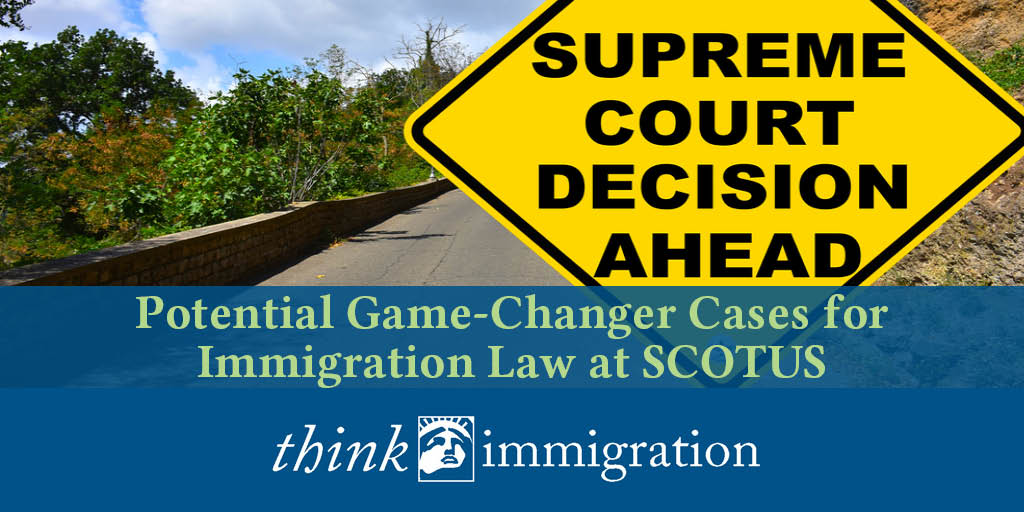As the U.S. government has grown and become more complex, many executive branch administrative agencies create, decide, and enforce their own rules. Attacks on the so-called “administrative state” are increasing and are reflected in three important cases pending before the United States Supreme Court. Depending on the Court’s ruling, the legitimacy of the current U.S. immigration justice system could be undermined, and the long-standing previous ruling Chevron c. Natural Resources Defense Council, 467 US 837, 104 S.Ct. 2778, 81 L.Ed.2d 694 (1984) and its standard of deference to decisions of federal administrative agencies could be overturned. AILA members should be aware of these potentially revolutionary developments.
Securities and Exchange Commission v. Jarkesy
On November 29, 2023, the United States Supreme Court will issue hear the pleadings In Securities and Exchange Commission v. Jarkesy, which raises two questions: (1) whether the SEC’s choice of enforcement procedure violates the nondelegation doctrine; and (2) whether dismissal for cause of administrative judges (ALJs) violates the U.S. Constitution. Both of these questions are important to immigration lawyers.
The nondelegation doctrine is based on the principle that Congress cannot delegate its legislative powers or legislative capacity to other entities. Some proponents of the doctrine believe that it can be interpreted to imply that Congress cannot delegate to the executive branch discretion that amounts to policy-making authority.
Some believe that a Supreme Court ruling in Mr. Jarkesy’s favor could significantly strengthen the nondelegation doctrine and limit the agency’s discretion. If applicable, Jarkesy is closely linked to the two other cases pending before the Supreme Court discussed below.
The second problem in Jarkesy calls into question the legitimacy of current U.S. immigration courts. When Congress passed the Administrative Procedure Act in 1946, it allowed ALJs to adjudicate administrative hearings. ALJs can only be removed if the U.S. government’s Merit Systems Protection Board finds “good reason” to do so.
In Jarkesy, a divided Fifth Circuit panel held that the SEC’s choice to rely on internal rulings instead of proceedings in federal court before the Article III judges violated the Seventh Amendment and the nondelegation doctrine, and that the ALJ’s dismissal for cause process violated the U.S. Constitution’s Prudence Clause. . Currently, more than 1,930 ALJs from more than thirty federal agencies collectively try millions of cases each year.
A ruling in favor of Mr. Jaresky could lead to a conclusion that immigration judges do not have the authority to rule on the cases assigned to them. Immigration judges are not ALJs (they are not ALJ adjudicators), which means that the arguments presented in Jaresky are even stronger in the face of immigration judges’ ability to hear cases. Article III of the U.S. Constitution states that “
Two lower courts reached opposing conclusions while Jarkesy is pending before the Supreme Court. In Frank’s Nursery, LLC v. Walshthe Southern District of Texas declined to extend the Fifth Circuit’s reasoning in Jarkesy and rejected a challenge to the legitimacy of the U.S. Department of Labor’s (DOL) authority to rule on enforcement of its H-2A visa program. On the other hand, in Burgess v. FDICThe U.S. District Court for the Northern District of Texas ruled that an FDIC enforcement proceeding that assessed civil monetary penalties violated the Seventh Amendment.
While some members of the Supreme Court might limit the scope of a decision invalidating the ALJ’s authority to cases involving agency decisions arising from enforcement proceedings (and leading to civil penalties), Justice Clarence Thomas proposed a broad definition of private rights that encompasses “life, liberty, and property.” In the broadest definition, deportation from the United States and protection from torture are certainly included.
Relentless, Inc. v. Commerce Department And Loper Bright Enterprises v. Raimondo
Broader administrative law challenges will be heard on January 17, 2024, when the Supreme Court hears oral arguments from Relentless, Inc. v. Commerce Department And Loper Bright Enterprises v. Raimondo. These cases began as challenges to a federal rule that requires the U.S. fishing industry to pay the costs of inspectors who monitor compliance with fishing rules. As part of the oral arguments, the justices will consider whether to limit or overturn the Court’s 1984 precedent in Chevron c. Natural Resources Defense Council. In Chevron, the Court held that when a federal law is ambiguous, federal courts should defer to an administrative agency’s interpretation of that law to the extent that that interpretation is “reasonable.” Reversal Chevron would revolutionize ABS litigation.
In the context of immigration law, cancel Chevron would impact challenges in U.S. district courts to decisions by U.S. Citizenship and Immigration Services, DOL, ICE, and even Customs and Border Protection (CBP ) the United States. Agency denials of I-130 petitions, I-129 petitions, and I-140 petitions would be open to new review by U.S. district court judges. Findings of inadmissibility made by CBP officers at U.S. ports of entry could also be subject to review by federal judges. At the same time, it could lead U.S. district courts to refuse to show deference to long-established policies of the agencies that immigration practitioners rely on. The net effect could be less predictability in U.S. immigration and more opportunities for judicial review for those who can afford to litigate in agency denial cases.
The potential impact of these three cases
The law of unintended consequences can be expressed from the decisions in the three Supreme Court cases described above. If immigration judges did not have the authority to issue deportation orders, immigration courts would effectively be frozen. The impact could fuel interest in legislation to transform immigration judges from non-ALJ adjudicators to Article III judges. The impact on USCIS decisions could be that circuit court precedents affect how USCIS adjudicators handle their day-to-day decision-making.

